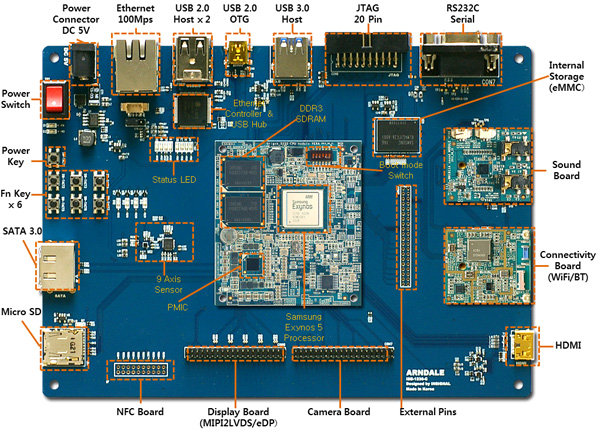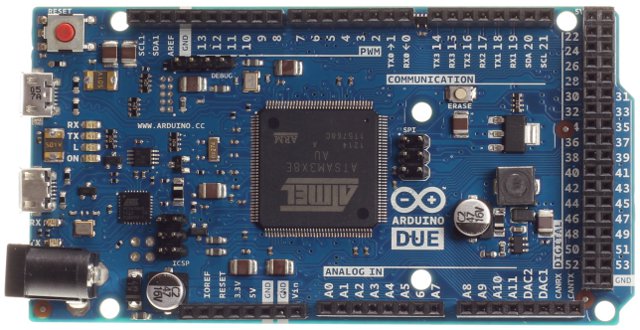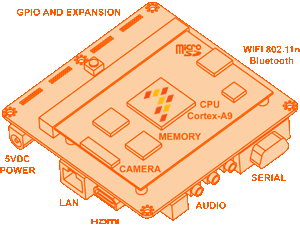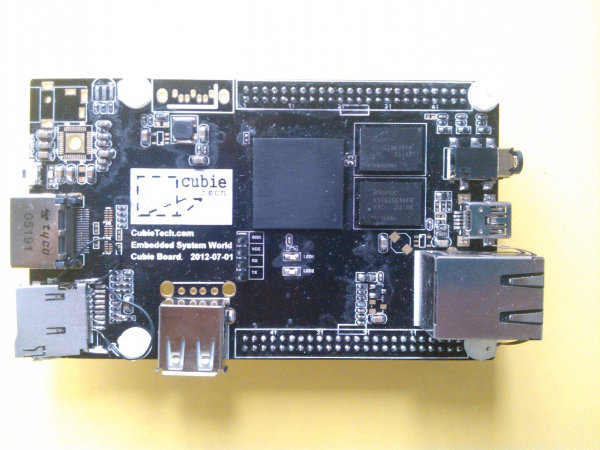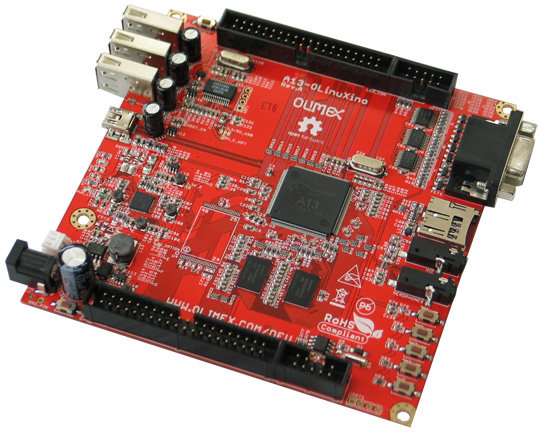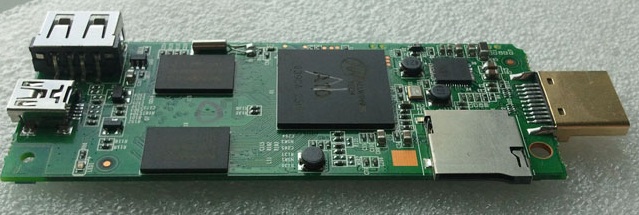You’ve probably heard about the ODROID-X development board announced in July by Hardkernel. They now have an updated version called ODroid-X2 with Samsung Exynos 4412 clocked at 1.7 GHz (vs 1.4 GHz) and 2 GB RAM (vs 1 GB RAM for the first version). They also boosted the Mali 400 clock speed from 400 MHz to 533 MHz. Apart from being a good mobile development platform, the 2 GB RAM could make the board a pretty good native ARM build machine under Ubuntu, as I’ve read 1 GB RAM is not always enough at link stage (e.g. for Debian packages, sorry I can’t find the link), unless you use swap which tremendously slows things down. The rest of the board seems identical and it just looks the same as the first version. Charbax shot a video of Hardkernel ODroid-X2 development board at ARM Techcon 2012: ODroid-X2 will cost $149 (ODroid-X […]
$249 Samsung Exynos 5 (Cortex A15) Arndale Development Board
Samsung has announced the first Cortex A15 development board available for purchase. Like the Origen board, Arndale development board has been designed by InSignal and features a dual core Exynos 5 (5250) cortex A15 processor @ 1.7 GHz, 2 GB RAM, internal storage via eMMC and plenty of ports. The development kit is composed of a CPU module (Exynos 5 , RAM and PMC) and a baseboard. Here are Arndale development board specifications: CPU Board Exynos 5 [email protected] GHz dual core 2GB 32-bit 800 MHz LPDDR3/LPDDR2 Base Board Sensors Accelerator : Invensence MPU-6050 Gyro : Invensence MPU-6050 e-Compass : AKM -AK8963C Camera Interfaces: ITU 601, MIPI CSI Video Ouput: HDMI 1.4 interface (micro HDMI) 1 channel eDP output Single WQXGA MIPI DSI interface USB: 1x USB3.0 Host 2x USB2.0 Host 1x USB 2.0 OTG SATA 1.0/2.0/3.0 interface 1 channel eMMC 4.5 1 channel SDIO 3.0 2 channel SD 2.0 (microSD slot) 4 channel […]
Arduino Due Cortex M3 Board is now Available
Announced a little over a year ago, the Arduino (over) Due based on Atmel SAM3U Cortex M3 MCU is finally available for purchase. The specifications of the new boards are as follows: Microcontroller – Atmel AT91SAM3X8E @ 84 Mhz Flash Memory – 512 KB SRAM – 96 KB (64 + 32 KB) Operating Voltage – 3.3V Input Voltage (recommended) – 7-12V Input Voltage (min/max) – 6-20V Digital I/O Pins – 54 including 6 supporting PWM Analog Input Pins – 12 Analog Output Pins – 2 (DAC) Total DC Output Current on all I/O lines – 130 mA DC Current for 3.3V Pin – 800 mA DC Current for 5V Pin – Theoretical 1A, recommended 800 mA Debug ports – JTAG/SWD connector The new board is mostly compatible with the AVR (8-bit) boards, but since the board runs at 3.3V some shields may not be compatible (Arduino Wi-Fi and Ethernet shields do […]
$69 – $89 Wandboard Freescale i.MX6 Solo and Dual Development Boards
The Wandboard is a low cost Linux ARM Cortex-A9 ARM board comprised of a CPU module and an interface board. There are actually 2 versions of the board (single and dual core) which are developed by a team of engineers during their spare time: Wandboard Solo – $69 – Freescale i.MX6 Solo + 512 MB RAM Wandboard Dual – $89 – Freescale i.MX6 Dual + 1 GB RAM Both boards come with Audio I/O, Optical S/PDIF, HDMI, a camera interface, 2 micro SD cardslot, a serial port, an expansion header, USB and USB OTG ports, a SATA connector and Gb Ethernet. The dual version also adds Wifi 802.11 b/g/n and Bluetooth support. There are not so many boards with native SATA support, so for those of you who need SATA this could be really be a good option. [Update: Although there’s a SATA connector on the baseboard, this is not […]
uClinux on Cortex-M3/M4 MCU: The Costs, Performance and Power Consumption
I previously wrote about different options available to run Linux on Cortex M3 & M4 Microcontrollers, and more recently Vladimir Khusainov, co-founder and Director of Engineering at Emcraft Systems,wrote a longish article entitled “Practical Advice on Running uClinux on Cortex-M3/M4” on electronicdesign.com, where he explains how SoM are usually selected, the costs of running uClinux on Cortex M3/M4 MCUs such as Freescale K70 or STmicroelectronics STM32F2/F4, as well as performance and power consumption considerations. First, Vladimir addresses one comment that says there’s basically no use for uClinux on Cortex M3/M4 MCU, since external memory is needed and an ARM7/ARM9 modules (with MMU) can be purchased for almost the same price. There are 2 counter arguments to this point of view: In practice, customers usually select an hardware platform first, then think what OS can be used on the platform. For example, if a company decided to use an hardware based […]
$49 Cubieboard: AllWinner A10 Open Hardware Development Board
The Cubieboard is a development board for the AllWinner A10 Cortex A8 processor. Contrary to some other AllWinner A10 “development board” that are simply based on a tablet or mini PC PCB, the cubieboard has been designed specifically as a development platform and provides access to I/O pins. Here are the specs of this development board: SoC – AllWinner A10 1GHz ARM cortex-A8 processor with Mali400 GPU System RAM – 1GB DDR3 @400MHz Storage – 2 MMC slot Video Output – HDMI 1080p Connectivity – 10/100M Ethernet USB – 2 USB Host, 1 USB OTG 1 IR sensor 96 expansion pins including i2c, spi, lvds, sata… Wi-Fi and Bluetooth can be supported via external USB dongle(s). The prototype above is the first revision of the hardware, and final hardware may look different. Some connectors (e.g. SATA) are not soldered in the picture above. The cubieboard is expected to be an […]
Olimex A13-OLinuXino-WIFI Developer Edition is Now Available
Olimex has announced that they started shipping A13-OLinuXino-WIFI-DEV, an AllWinner A13 development board with 512 MB, 4GB and a Realtek RTL8188CU Wi-Fi module that costs 55.00 Euros with free shipping by courier for a limited time. They announced the start of this project late April, so it took them just 3 months to bring this board to to market. The board has the following specs: SoC – AllWinner A13 Cortex A8 processor at 1GHz, 3D Mali400 GPU Memory – 512 MB RAM Storage – 4GB NAND flash + SD Card slot Power – 6-16VDC input power supply, noise immune design USB – 3 + 1 USB Host, 3 available for users and 1 for Wi-Fi module + 1 USB OTG port Wi-Fi – WIFI RTL8188CU 802.11n 150Mbit module on board Video output – VGA video output + LCD signals available on connector. Audio Output / Input RTC – PCF8536 on […]
QuickEmbed UPuter Pi – $69 AllWinner A10 Development Board
I’ve been informed of a new AllWinner A10 development board which is marketed as some sort of Raspberry Pi “clone”, although the hardware is different. The UPuter Pi is a small board designed by QuickEmbed Technology, a Shanghai based company, that features AllWinner A10 processor @ 1.5 GHz, 512 to 1 GB RAM, and 4 to 8 GB Flash. Here are the specs as mentioned on the company website: CPU 1.5GHz ARM Cortex-A8 multi-core Mali400 graphic engine Memory 512M/1GB DDR3 Flash 4G/8G DC 5V USB power working temperature -10 to 70C storage temperature -20 to 80C Android 4.0 WIFI/RJ45 network USB/Wireless keyboard/mouse 3G usb card TF card, U-disk, usb harddisk 720P/1080P/2160P I must have gone blind because I don’t see any RJ45 connector (for Ethernet). The board will support Android 4.0 and all the usual Linux distros supported by Allwinner A10 processor. QuickEmbed may have pushed the clone concept a […]



